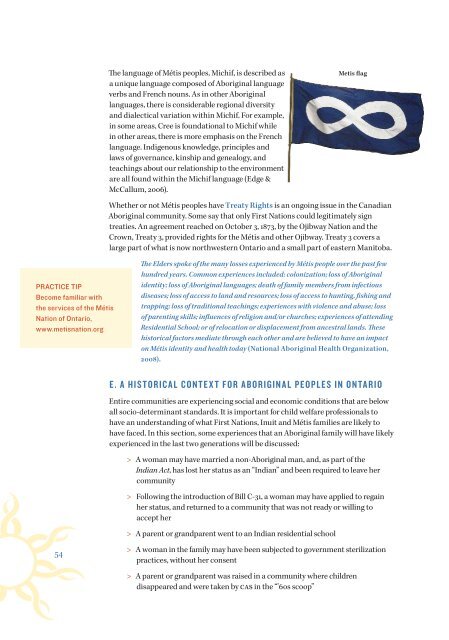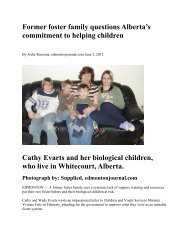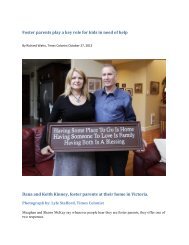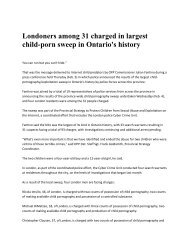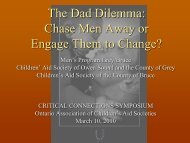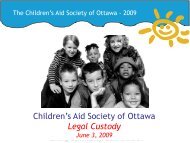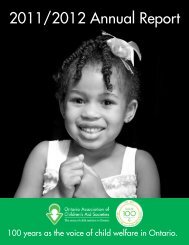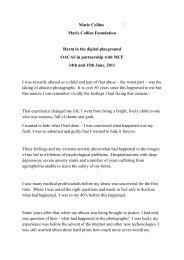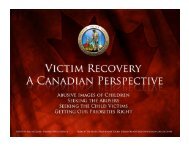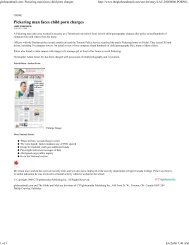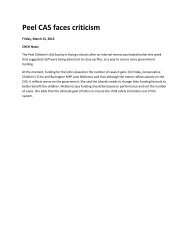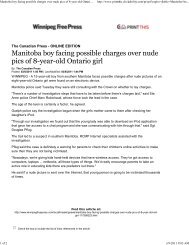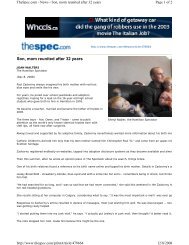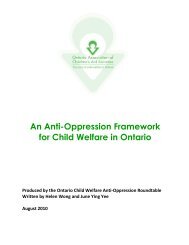English - Ontario Association of Children's Aid Societies
English - Ontario Association of Children's Aid Societies
English - Ontario Association of Children's Aid Societies
Create successful ePaper yourself
Turn your PDF publications into a flip-book with our unique Google optimized e-Paper software.
The language <strong>of</strong> Métis peoples, Michif, is described as<br />
a unique language composed <strong>of</strong> Aboriginal language<br />
verbs and French nouns. As in other Aboriginal<br />
languages, there is considerable regional diversity<br />
and dialectical variation within Michif. For example,<br />
in some areas, Cree is foundational to Michif while<br />
in other areas, there is more emphasis on the French<br />
language. Indigenous knowledge, principles and<br />
laws <strong>of</strong> governance, kinship and genealogy, and<br />
teachings about our relationship to the environment<br />
are all found within the Michif language (Edge &<br />
McCallum, 2006).<br />
Metis flag<br />
Whether or not Métis peoples have Treaty Rights is an ongoing issue in the Canadian<br />
Aboriginal community. Some say that only First Nations could legitimately sign<br />
treaties. An agreement reached on October 3, 1873, by the Ojibway Nation and the<br />
Crown, Treaty 3, provided rights for the Métis and other Ojibway. Treaty 3 covers a<br />
large part <strong>of</strong> what is now northwestern <strong>Ontario</strong> and a small part <strong>of</strong> eastern Manitoba.<br />
PRACTICE TIP<br />
Become familiar with<br />
the services <strong>of</strong> the Métis<br />
Nation <strong>of</strong> <strong>Ontario</strong>,<br />
www.metisnation.org<br />
The Elders spoke <strong>of</strong> the many losses experienced by Métis people over the past few<br />
hundred years. Common experiences included: colonization; loss <strong>of</strong> Aboriginal<br />
identity; loss <strong>of</strong> Aboriginal languages; death <strong>of</strong> family members from infectious<br />
diseases; loss <strong>of</strong> access to land and resources; loss <strong>of</strong> access to hunting, fishing and<br />
trapping; loss <strong>of</strong> traditional teachings; experiences with violence and abuse; loss<br />
<strong>of</strong> parenting skills; influences <strong>of</strong> religion and/or churches; experiences <strong>of</strong> attending<br />
Residential School; or <strong>of</strong> relocation or displacement from ancestral lands. These<br />
historical factors mediate through each other and are believed to have an impact<br />
on Métis identity and health today (National Aboriginal Health Organization,<br />
2008).<br />
E. A HISTORICAL CONTEXT FOR ABORIGINAL PEOPLES IN ONTARIO<br />
Entire communities are experiencing social and economic conditions that are below<br />
all socio-determinant standards. It is important for child welfare pr<strong>of</strong>essionals to<br />
have an understanding <strong>of</strong> what First Nations, Inuit and Métis families are likely to<br />
have faced. In this section, some experiences that an Aboriginal family will have likely<br />
experienced in the last two generations will be discussed:<br />
> > A woman may have married a non-Aboriginal man, and, as part <strong>of</strong> the<br />
Indian Act, has lost her status as an “Indian” and been required to leave her<br />
community<br />
> > Following the introduction <strong>of</strong> Bill C-31, a woman may have applied to regain<br />
her status, and returned to a community that was not ready or willing to<br />
accept her<br />
> > A parent or grandparent went to an Indian residential school<br />
54<br />
> > A woman in the family may have been subjected to government sterilization<br />
practices, without her consent<br />
> > A parent or grandparent was raised in a community where children<br />
disappeared and were taken by CAS in the “’60s scoop”


